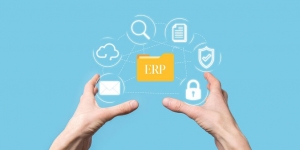عرض العناصر حسب علامة : تخطيط موارد المؤسسات
رسالة ماجستير: تقييم أثر العلاقة بين تطبيق نظم تخطيط موارد المنشأة ERP وقيمة المنظمة
ترجع أهمية الدراسة إلى ما يشهده العالم الآن من تطور هائل في نظم تکنولوجيا المعلومات وسعي المنشآت الدائم نحو الإستخدام الأمثل لکافة الموارد المتاحة
ما هو نظام تخطيط موارد المؤسسة ولماذا تحتاجه؟
ERP هو اختصار يرمز إلى برنامج تخطيط موارد المؤسسة يعتبر برنامج لإدارة عمليات الأعمال حيث يدير ويدمج البيانات المالية للشركة، وسلسلة التوريد، والعمليات، والتجارة، وإعداد التقارير، والتصنيع، وأنشطة الموارد البشرية. تمتلك معظم الشركات شكلًا من أشكال النظام المالي والتشغيلي، ولكن معظم البرامج الموجودة لا يمكنها تجاوز العمليات التجارية اليومية أو المساعدة في نمو الأعمال في المستقبل.
معلومات إضافية
-
المحتوى بالإنجليزية
What is ERP and why do you need it?
ERP is an acronym that stands for enterprise resource planning (ERP). It’s a business process management software that manages and integrates a company’s financials, supply chain, operations, commerce, reporting, manufacturing, and human resource activities. Most companies have some form of finance and operational system in place but most of the software that’s out there can’t go beyond everyday business processes or help with future business growth.
As company’s needs change and they expand, their systems should keep up with them. We’ll define what ERP is and why it’s smart to have software in place that keeps up with your business needs.
What is enterprise resource planning? Yesterday and today.
Historically, ERP systems were monolithic suites that that worked separately and didn’t talk with other systems. Each system required expensive, complex, and customized code to meet unique business requirements which slowed—or even prevented—the adoption of new technology or process optimization.
What makes today’s ERP software different is that it brings all these different processes to the table and together in one fluid system. And not just offering data connectivity within your ERP system, but also within your productivity tools, e-commerce, and even customer engagement solutions. Helping you connect all your data for better insights that help you optimize your processes across your entire business.
In addition, a modern ERP solution offers flexible deployment options, improved security and privacy, sustainability, and low-code customization. But most importantly, it will build continuity and resiliency into your business and processes through insights that help you innovate at a rapid rate today while preparing your business for what’s next tomorrow.
Why ERP is critical for your businesses
While there’s no all-up solution software for every business process, ERP technology is getting better and better at bringing processes together. Once your processes, systems, and data are connected, you’ll get the intelligence, acceleration, and adaptability you need to start optimizing your operations.
Here’s three ways ERP can improve your business:
1
Drive optimal performance
With solutions that integrate artificial intelligence (AI), you’ll access insights that enhance your decision making and reveal ways to improve operational performance going forward.
2
Accelerate operational impact
By connecting processes and data, you’ll bring more visibility and flexibility to employees to help them take action quickly and deliver more value across the business.
3
Ensure business agility
Many ERP solutions are built to adapt to your needs and grow with you, helping you proactively prepare for—and readily respond to—any operational disruption or market change.
What business functions benefit from ERP?
ERP can cover many core functions across your organization—helping break down the barriers between the front office and back office while offering the ability to adapt your solution to new business priorities. Some of the key business functions include:
Commerce
Today’s retailers face many challenges and an ERP system can deliver a complete, omnichannel solution that unifies back-office, in-store, and digital experiences. Customers will get a more personalized and seamless shopping experience through AI recommendations, while retailers are able to increase employee productivity, help reduce fraud, and grow their business.
Finance
Modern ERP will help you increase profitability while driving compliance. It offers dashboards and AI-driven insights that give you an overview of your finances to help you tap into the real-time information anytime and anywhere. It should also help you cut down on entering information manually by automating daily tasks and include tracking abilities that help with your business’s regulatory compliance.
Human resources
Modern solutions offer ways to manage company data and streamline employee management tasks like payroll, hiring, and other duties. You’ll be in a better position to help retain, recruit, and empower employees while also tracking employee performance and identifying HR problems before they happen.
Manufacturing
This function improves business communication, automates daily processes through robotic process automation, and offers manufacturers the ability to fulfill customer needs and manage resources by accessing real-time data. This solution also optimizes project and cost management as well as production planning.
Supply chain
If your company is still entering information by hand and trying to track down inventory in your warehouse, you can easily save time and money by automating these processes with ERP. Modern solutions also offer dashboards, business intelligence, and even Internet of Things (IoT) technology to help you get a handle on your inventory management.
Three signs that you need ERP
If you’re reading this and struggling with your legacy system, you probably already know that implementation is in your future, but here are the signs that you definitely need new ERP starting today:
1
The basics aren’t letting you grow
Perhaps you’ve been doing fine with basics, but if your current software is putting limits on your market expansion and ability to grow on a global scale, it may be time for a better ERP system that does.
2
You’re dealing with disparate systems
As technology changes, you’re noticing that your disparate systems don’t work well together. You may notice that your new accounting software isn’t compatible with your old HR system, and you’re tired of wasting time and resources trying to stitch a solution together.
3
You can’t meet customer expectations
If your staff and customers are mobile and your system isn’t accommodating them, it’s time to invest in one that meets everyone’s needs. If you feel like you can’t afford to invest in meeting your customer’s expectations, and you’re not willing to give your staff the tools they need to succeed, you’ll lose them to a competing business pure and simple.
TIP:
If you or your staff is asking for a new system and there’s a resistance to an ERP change, one of the ways to combat this is to schedule a demo so everyone can see what’s out there. Plus, when everyone feels like they’re included in on the decision process it’ll make implementation much easier.
Why some businesses are afraid to embrace ERP implementation
Despite all the options out there, some companies are still hesitant about implementing ERP. There could be many reasons why, but where there’s a fear, there’s a solution.
FEAR: How do I know I’m choosing the right ERP solution for my business?
You don’t have to find the perfect software solution to fix everything. ERP should actually be able to take the best of the business processes you’re using now and bring them together under one system, while letting everyone in your organization view the same information. This is where your choice of at technology partner is important.
FEAR: We can’t afford a major ERP overhaul.
A solution doesn’t have to be an all or nothing implementation proposition. Software solution modules can be purchased separately depending on your business needs. This will help your team ease into the implementation piece of ERP and it’ll save having to invest in a major software renovation without knowing whether or not the functions you’re adding will pay off.
FEAR: We don’t want to lose the systems we have in place now.
As we mentioned, any ERP solution you choose should work with what you’re using now but also include features that can help in your future growth. For instance, if the software you have mostly handles the financial, supply chain, and manufacturing sides of your business, you may want to look for a solution that brings in a strong business intelligence component.
Discover what modern ERP can do for your business
Now that you’ve got a good grasp on what ERP is, discover the ways that Microsoft Dynamics 365 brings the best of what modern enterprise resource planning has to offer your business—modular, end-to-end business applications that connect all your data for continuous insights that help you rapidly respond to change so you’re future-ready.


